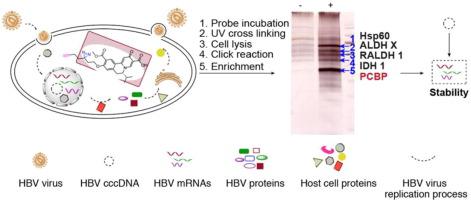Bioorganic & Medicinal Chemistry Letters ( IF 2.5 ) Pub Date : 2020-10-17 , DOI: 10.1016/j.bmcl.2020.127615 Qing Zhang 1 , Jianzhou Huang 2 , Hoi Yee Chow 1 , Jinzheng Wang 1 , Yingjun Zhang 2 , Yi Man Eva Fung 1 , Qingyun Ren 2 , Xuechen Li 1

|
Chronic hepatitis B virus (HBV) infection has been a serious public health burden worldwide. Current anti-HBV therapies could not eliminate HBV ultimately. Considering the characteristics of HBV, it is impossible to be entirely cured based on current therapies. Therefore, it is urgently needed to develop novel therapeutic agents with new mechanism of action. The dihydroquinolizinone (DHQ) derivatives exhibited potent anti-HBV activity by decreasing HBV DNA and HBsAg level in an obscure mechanism of action. In this study, we have optimized the DHQ scaffold, developed the photoaffinity probe, with which to identify potential binding proteins.
中文翻译:

基于DHQ的化学生物学探针的开发,用于分析HBV的细胞靶标
慢性乙型肝炎病毒(HBV)感染已成为世界范围内严重的公共卫生负担。当前的抗HBV疗法最终不能消除HBV。考虑到HBV的特征,根据目前的疗法不可能完全治愈。因此,迫切需要开发具有新作用机理的新型治疗剂。二氢喹啉嗪酮(DHQ)衍生物通过降低作用机理中的HBV DNA和HBsAg水平而显示出有效的抗HBV活性。在这项研究中,我们优化了DHQ支架,开发了光亲和探针,用于鉴定潜在的结合蛋白。











































 京公网安备 11010802027423号
京公网安备 11010802027423号